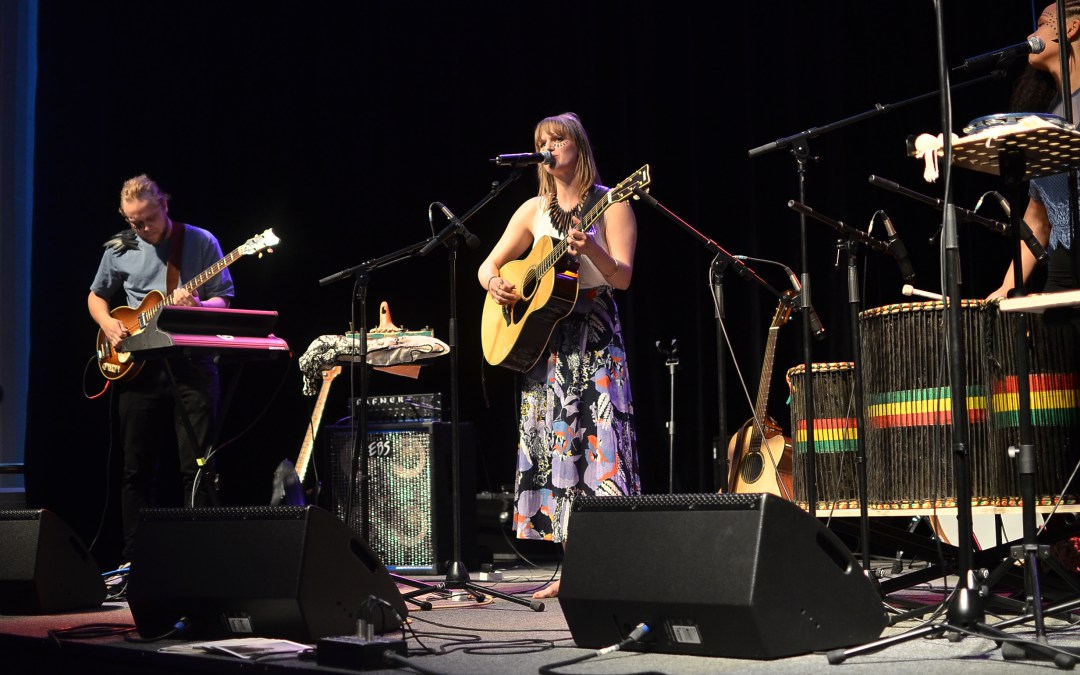[SPOT is collaborating with Jutland Station and will bring you their articles in our news section. Be sure to check out their page at http://www.jutlandstation.dk]
by Cyanara Vetch, feature photo by Marisse Panaligan, Jutland Station.
– – –
At the SPOT+ conference on Saturday, ‘The Changing Face of Music’ sought to discuss the present and future role of women in what is, in Denmark, a largely male-dominated business.
Laura Kaae wants to “Show it not tell it”. Show experimental female musicians from the Nordic countries and let their talent speak for them. No manifestos on women’s empowerment, just great music spanning from Greenland to Norway.
With her partner Kat Jarby, Kaae has set up Nordex (Nordic Music Export) to bring together artists from across the region and help learn lessons that have worked in the different countries. In an all-female panel (that happened by accident when they failed to get a guy to join the other speakers) at SPOT+ on Saturday, music professionals discussed how they could help their home-grown artists get exposure in neighbouring countries and ultimately export music in a bloc as a Nordic genre.
Putting Nordic on the map
Anna Ingler from Upfront Music in Sweden and Kaae both had the same experiences in New York meeting with industry professionals. There was a lot of enthusiasm for what was Nordic, but not a lot of knowledge to differentiate between the different countries. These women are savvy enough to see that Nordic is seen as exotic right now. They jokingly point to Game of Thrones and break-out hit high school drama from Norway, Skam, as catalysts for the current focus of attention. Pippaluk Lund is down to earth and pragmatic, and has a mission to put Greenland on the map with the Nordic music scene. She says, “Nordic is a new vibe, a new trend, that we should all be taking advantage of for our local artists.”
These women are leading the way for collaboration and to get Nordic music on the world stage, but their accomplishments mask an uncomfortable reality. Despite its reputation for being such a progressive country, Denmark’s music scene is overwhelmingly male. Around 20-30% of those involved in the sector are women, and this drops to about 2% when you look at the technical role of sound engineers. Most of the festival bookers, and directors of the big organisations – essentially the people making the big decisions – are men.
Feminism fatigue?
Some believe the problem is that there is not much new to say about the issue, and there is a kind of attention fatigue about feminism in Denmark. Polina Bachlova is from Canada but is based in Denmark working for Girls Are Awesome, an organisation with the mandate to be “a global platform for creative expression, portraying women who live their lives with style and strength.” Bachlova says the attitude towards feminism in Denmark is different to back in Canada. There is less acceptance of the term here. One theory is that, though Denmark led the way in the 70s, in the 80s the movement was seen as overly aggressive and elitist, and not something that many women wanted to be associated with. The stigma lingers today.

Another theory is the often cited Danish Jante’s Law, which stresses that no one person should think they are better or differentiated from others. Nonetheless, whatever the background, and with the existence of some resistance to the term ‘feminism’, women continue to rise through the industry.
Le Gammeltoftsgade is a successful Danish DJ and radio host who has taken her success to another level by starting her own radio station, Heartbeats.dk. She is passionate about the media’s responsibility to expose music consumers to new and different artists, “to go beyond what they would find on Spotify.”
“I have never seen myself as a woman in a man’s world. Anything I have wanted to do, I have gone for,” she says. Le Gammeltoftsgade has two daughters and says that her goal is to teach them that, whatever they want to do, they shouldn’t think twice whether it’s for them. Ida Redig, a Swedish female producer and songwriter, taught herself production skills video by video through YouTube. She also believes that the music industry will only get more women when girls are engaged and brought in from a young age.
Laura Kaae of Nordex says, “I don’t think that people don’t get that the battle’s not won yet.” But woman by woman, producer by producer and school girl by school girl, they are making ground.

